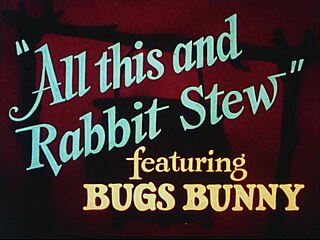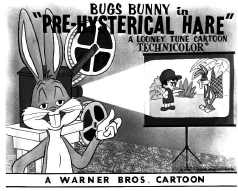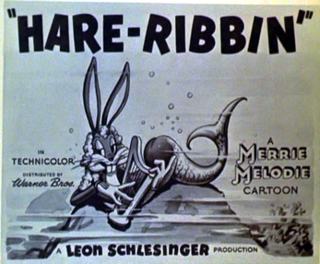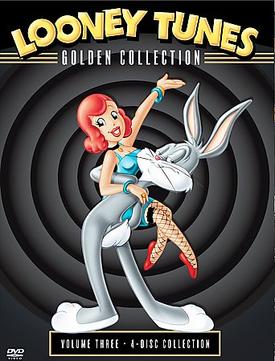
Looney Tunes is an American media franchise produced and distributed by Warner Bros. The franchise began as a series of animated short films that originally ran from 1930 to 1969, alongside its spin-off series Merrie Melodies, during the golden age of American animation. Following a revival in the late 1970s, new shorts were released as recently as 2014. The two series introduced a large cast of characters, including Bugs Bunny, Daffy Duck, and Porky Pig. The term Looney Tunes has since been expanded to also refer to the characters themselves.

Merrie Melodies is an American animated comedy short film series distributed by Warner Bros. Pictures. It was part of the Looney Tunes franchise and featured many of the same characters. It originally ran from August 2, 1931, to September 20, 1969, during the golden age of American animation, though it was revived in 1979, with new shorts sporadically released until June 13, 1997. Originally, Merrie Melodies placed emphasis on one-shot color films in comparison to the black-and-white Looney Tunes films. After Bugs Bunny became the breakout character of Merrie Melodies and Looney Tunes transitioned to color production in the early 1940s, the two series gradually lost their distinctions and shorts were assigned to each series randomly.
DePatie–Freleng Enterprises, Inc. was an American animation studio founded by former Warner Bros. Cartoons employees in May 1963, before being acquired by Marvel in 1981 and renamed Marvel Productions. Based in Burbank, California, DFE produced animation for film and television.

All This and Rabbit Stew is a 1941 Merrie Melodies cartoon directed by Tex Avery. The cartoon was released on September 13, 1941, and features Bugs Bunny.

The Looney Looney Looney Bugs Bunny Movie is a 1981 American animated comedy package film with a compilation of classic Looney Tunes/Merrie Melodies Warner Bros. cartoon shorts and animated bridging sequences produced and directed by Friz Freleng, hosted by Bugs Bunny. The new footage was produced by Warner Bros. Animation. It was the first Looney Tunes/Merrie Melodies film with a compilation of classic cartoon comedy shorts produced by Warner Bros. Animation.

Daffy Duck & Egghead is a 1938 Warner Bros. Merrie Melodies cartoon produced in 1937 and directed by Tex Avery. The cartoon was released on January 1, 1938, and stars Daffy Duck and Egghead.

Pre-Hysterical Hare is a 1958 Warner Bros. Looney Tunes cartoon directed by Robert McKimson and written by Tedd Pierce. The short was released on November 1, 1958, and stars Bugs Bunny and Elmer Fudd. The two are in their usual hunter-and-bunny antics, but set in the Stone Age.
Robert Cameron Bruce Jr. was an American voice actor and the son of Robert Cameron Bruce (1887–1948) who was a cinematographer and documentary producer. He was the narrator for a number of Warner Bros. cartoons in the 1930s and 1940s. The Looney Tunes and Merrie Melodies series' had occasional entries which were driven not by one of their stable of stars such as Bugs Bunny or Daffy Duck, but by individual short sketches, usually filled with sight gags and word-play. Later he was a writer and producer of industrial motion pictures based in Minnesota.

Hare Ribbin' is a 1944 animated short film in the Merrie Melodies series, directed by Robert Clampett and featuring Bugs Bunny. The plot features Bugs' conflict with a red-haired hound dog, whom the rabbit sets out to evade and make a fool of using one-liners, reverse psychology, disguises and other tricks. It was released in theaters by Warner Bros. on June 24, 1944. The title is a pun on "hair ribbon".
This is a listing of all the animated shorts released by Warner Bros. under the Looney Tunes and Merrie Melodies banners between 1950 and 1959.
This is a listing of all the animated shorts released by Warner Bros. under the Looney Tunes and Merrie Melodies banners between 1960 and 1969. A total of 147 shorts were released during the 1960s.
This is a listing of all theatrical animated shorts released by Warner Bros. under the Looney Tunes and Merrie Melodies banners between 1970 and the present. It also lists shorts originally planned for theatrical release and other shorts that were not feature films, television series, or television specials.

Devil's Feud Cake is a 1963 Warner Bros. Merrie Melodies animated short directed by Friz Freleng. The short was released on February 9, 1963, and stars Bugs Bunny and Yosemite Sam.
The Dixie Fryer is a 1960 Warner Bros. Looney Tunes cartoon short directed by Robert McKimson. The cartoon was released on September 24, 1960, and features Foghorn Leghorn.

Looney Tunes Golden Collection: Volume 3 is a DVD box set from Warner Home Video that was released on October 25, 2005. It contains 60 Looney Tunes and Merrie Melodies theatrical short subject cartoons, nine documentaries, 32 commentary tracks from animators and historians, 11 "vintage treasures from the vault", and 11 music-only or music-and-sound-effects audio tracks.
Buddy's Lost World is a 1935 Warner Bros. Looney Tunes cartoon, directed by Jack King. The short was released on May 18, 1935, and stars Buddy, the second star of the series.








